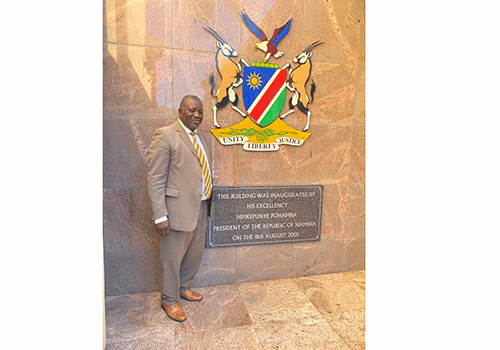Ndaningaweni Protasius Nghileendele
Ndaningaweni Protasius Nghileendele is a proud public servant employed at the National Assembly in the Directorate of Committee Services as the deputy director.
He works as the head of the secretariat of the Parliamentary Standing Committee on Public Accounts and the Parliamentary Standing Committee on Information, Communication, Technology and Innovation.
The parliamentary standing committees are permanent committees established by Parliament to review bills and policies proposed and being tabled in Parliament. Committees meet regularly to review existing legislation and appropriations to determine the effectiveness of existing policy.
As the deputy director of the standing committees division, Nghileendele is responsible for the supervision of staff and the provision of procedural advice on all matters about the work and functions of committees.
“Under my ambit, I arrange and prepare committee meetings and hearings; develop annual work plans for the committees; draft, compile, and edit reports,” Nghileendele said.
Besides that, Nghileendele works as a liaison between Parliament and the public by facilitating public hearings to collect the views of interested groups and citizens.
He is also involved in the drafting of speeches, legislation, and related documents; takes minutes of committee meetings; draws up and administers committee budgets; handles logistics and assists members of Parliament to fulfil their mandates.
Born and raised in Oshikuku in the Omusati region, Nghileendele is not new to the industry, he got his first taste of the civil service in 1997 through the Ministry of Environment and Tourism. He served that ministry for more than 10 years but eventually moved up to the parliament standing committee deputy director’s job.
Nghileendele matriculated from St Joseph’s Roman Catholic High School, Dobra, then pursued a Bachelor of Science Degree with two majors in zoology and geography.
“I then studied for a Postgraduate Diploma in Education with a specialisation in biology and geography all at the University of Namibia (Unam). Thereafter, I did a Bachelor of Science Honours Degree in Geography at the University of Port Elizabeth (UPE) and then a Master of Environmental Science Degree at the University of KwaZulu-Natal-Howard College,” he said.
Nghileendele has committed his remaining productive years before retirement to public service as a token of appreciation for all the opportunities that the government accorded to him, more specifically to further his studies.
Responding to a question on what attracted him to public service, Nghileendele said, “I did not join but was bound by a contractual agreement with the government because my undergraduate studies were funded with a bursary from the government, and I was required to work for the government for an equal number of years I was given a bursary. Therefore, the question is rather, why did I decide to stay after I met my contractual obligations?
Not really, but on joining the government I found the work absolutely fulfilling, therefore, I decided to stay,” he states.
Admittedly, Nghileendele points out the enormous opportunities available in the public service, whether in terms of career growth or training and skill enhancement support for knowledge as some of the benefits motivated him to find employment in public service. Every job comes with its set of challenges and Nghileendele’s position is not an exception. According to him, working with the country’s lawmakers and elected representatives of the Namibian people is in itself a challenge as one has to think on his feet and it requires constant hard work and total commitment, according to Nghileendele, that is an insurmountable challenge.
“Working for Parliament is a badge of honour, prestige, and a privilege. It is intrinsically satisfying to know that my job involves shaping the legislation which governs this country.” When asked to point out some of the accomplishments at the personal and institutional level, Nghileendele had this to say, “the directorate of committee service is so to speak the engine that runs the National Assembly. In other words, the National Assembly mostly performs its functions through the different committees, Therefore, the National Assembly benefits from my expertise through the work of committees. I am proud of my contributions to reviewing the Policy on Human-Wildlife Conflict, the Civil Aviation Act, and the Access to Information Act.”
Queried on the perception that all civil servants are lazy and largely ineffective, Nghileendele called on the masses to desist from “painting the entire civil service with the same brush”.
“I do not agree with the sentiment. It is a baseless generalisation. Most civil servants I know, and met over the years – and I have been around long enough to know what is happening – are hard workers who are dedicated to their jobs. I believe this myth stems from ignorance of our work as civil servants. I am not saying there are not a few rotten apples,” he said.
Asked about his plans, the long-serving civil servant said it is difficult for him to put a timeline on how long he is still planning to work for the government because one never knows what the future holds.
Nghileendele dreams of career progression and to pursue other interests which he could not be able to do while serving in the public service.



